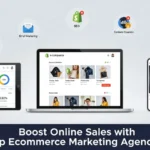
How to Transform Your Digital Marketing Strategy with AI
Introduction: Embracing the AI Revolution in Digital Marketing
Artificial intelligence (AI) is rapidly reshaping the landscape of digital marketing. Businesses that adapt and integrate AI into their strategies are poised to gain a significant competitive advantage. From automating tasks to personalizing customer experiences, AI offers unprecedented opportunities to enhance marketing efforts and achieve better results. This guide will walk you through the steps to successfully integrate AI into your digital marketing strategy.
Step-by-Step Guide to Integrate AI into Your Digital Marketing Strategy
Step 1: Assess Your Current Digital Marketing Landscape
Before diving into AI, it’s crucial to evaluate your existing marketing efforts. Identify areas where you’re facing challenges or where improvements can be made. Analyze your current strategies, tools, and performance metrics. Determine where AI can be most effective, such as in SEO, content creation, social media management, or customer relationship management. Understanding your current landscape will help you set realistic goals and choose the right AI tools.

Step 2: Define Your AI Goals and Objectives
Setting clear, measurable goals is essential for any AI implementation. Use the SMART framework to define your objectives:
- Specific: What do you want to achieve?
- Measurable: How will you track progress?
- Achievable: Is the goal realistic?
- Relevant: Does it align with your overall business strategy?
- Time-bound: When do you want to achieve the goal?
For example, a SMART goal could be: “Increase organic traffic by 20% within six months by optimizing content with AI tools.”

Step 3: Choose the Right AI Tools and Platforms
Selecting the right AI tools is critical to your success. The market offers a wide range of AI tools for various marketing functions. Some popular choices include:
- AI tools for SEO: Tools like Semrush, Ahrefs, and Surfer SEO use AI to help with keyword research, content optimization, and rank tracking.
- AI tools for Content Creation: Platforms like Jasper.ai, Copy.ai, and Writesonic can generate content, refine copy, and personalize messaging.
- AI tools for Social Media: Tools like Hootsuite and Buffer use AI to schedule posts, analyze performance, and identify optimal posting times.
Research and evaluate different tools based on your specific needs, budget, and technical capabilities. Consider reading reviews and comparing features to make an informed decision.

Step 4: Implement AI Solutions: A Practical Approach
Once you’ve chosen your AI tools, it’s time to integrate them into your marketing workflows. This involves several steps:
- Setup and Configuration: Follow the tool’s instructions to set up your account and configure the necessary settings.
- Data Integration: Connect your AI tools with your existing marketing platforms and data sources. This may involve integrating with your CRM, website analytics, and social media accounts.
- Training and Customization: Some AI tools require training and customization to perform optimally. This could involve providing examples of your brand voice, defining your target audience, or inputting specific data.

Step 5: Train and Optimize Your AI Models
AI models require continuous training and optimization to improve their performance. Provide the AI with relevant data and feedback to help it learn and adapt. Regularly review the results and make adjustments to the AI’s parameters, algorithms, or data inputs. The more data you provide and the more you refine the model, the better it will perform.

Step 6: Monitor, Analyze, and Refine
Regularly monitor the performance of your AI-driven campaigns. Use key performance indicators (KPIs) to track progress and measure success. Some important KPIs to consider include:
- Website traffic: Track the number of visitors to your website.
- Conversion rates: Measure the percentage of visitors who complete a desired action (e.g., making a purchase, signing up for a newsletter).
- Engagement metrics: Monitor social media likes, shares, comments, and other engagement metrics.
- Cost per acquisition (CPA): Calculate the cost of acquiring a new customer.
Analyze the data to identify what’s working and what’s not. Make adjustments to your AI-driven campaigns based on the analysis. This iterative process is key to achieving optimal results.

Tips and Warnings: Navigating the AI Landscape
Data Privacy and Ethical Considerations
Data privacy and ethical use of AI are paramount. Ensure that you comply with all relevant data privacy regulations, such as GDPR and CCPA. Be transparent with your audience about how you are using AI and data. Avoid using AI in ways that could lead to bias, discrimination, or harm. Prioritize user privacy and ethical considerations in all your AI initiatives.

The Human Touch: Balancing AI and Creativity
While AI can automate many tasks, it’s important to maintain a balance between AI and human creativity. Use AI to augment your marketing efforts, not replace human oversight. Human creativity, strategic thinking, and emotional intelligence are still crucial for creating compelling marketing campaigns that resonate with your audience.

Avoiding Common Pitfalls
Be aware of potential challenges when implementing AI in marketing. Common pitfalls include:
- Over-reliance on AI: Don’t blindly trust AI recommendations. Always review and validate the results.
- Lack of data quality: AI models are only as good as the data they are trained on. Ensure your data is accurate, complete, and relevant.
- Ignoring the audience: Always keep your target audience in mind when using AI.

Conclusion: The Future of Digital Marketing is Intelligent
Integrating AI into your digital marketing strategy is no longer optional; it’s essential for staying competitive. By following the steps outlined in this guide, you can harness the power of AI to enhance your campaigns, improve efficiency, and achieve better results. Remember to prioritize data privacy, ethical considerations, and the balance between AI and human creativity. Embrace the future of digital marketing and unlock the full potential of AI.

Quick Summary
This guide provides a step-by-step approach to integrating AI into your digital marketing strategy, covering assessment, goal setting, tool selection, implementation, optimization, and ongoing monitoring. By following these steps, marketers can leverage AI to enhance their campaigns, improve efficiency, and achieve better results. Remember to address data privacy, ethical considerations, and maintain a balance between AI and human creativity for the best outcomes.
FAQ
How can AI improve my SEO efforts?
AI can significantly improve your SEO efforts by:
- Keyword Research: Identifying the most relevant and high-performing keywords.
- Content Optimization: Optimizing content for search engines and improving readability.
- Improving Search Rankings: Analyzing your competitors and identifying opportunities to improve your search rankings.
What are the main benefits of using AI in content creation?
AI offers several benefits in content creation, including:
- Automated Content Generation: Generating content quickly and efficiently.
- Personalized Content: Tailoring content to individual user preferences.
- Improved Content Performance: Analyzing content performance and optimizing it for better results.
How do I measure the success of my AI-driven marketing campaigns?
Measure the success of your AI-driven campaigns using key performance indicators (KPIs) such as: website traffic, conversion rates, engagement metrics (likes, shares, comments), and cost per acquisition (CPA).
Is AI going to replace human marketers?
AI is not going to replace human marketers. Instead, AI will augment the work of marketers. Human oversight, strategic thinking, and creativity remain essential for creating successful marketing campaigns. AI will automate tasks and provide insights, allowing marketers to focus on higher-level strategic initiatives.
Additional Resources / References
- How to Design an AI Marketing Strategy – Harvard Business Review (https://hbr.org/2021/07/how-to-design-an-ai-marketing-strategy)
- How is AI shaping your digital marketing strategies? What AI tools … (https://www.reddit.com/r/DigitalMarketing/comments/1fq6w6t/how_is_ai_shaping_your_digital_marketing/)
- How AI tools are impacting digital marketing strategies (https://www.ie.edu/uncover-ie/how-ai-tools-are-impacting-and-shaping-the-future-of-digital-marketing-strategies/)
- AI in Digital Marketing – The Ultimate Guide (https://digitalmarketinginstitute.com/blog/ai-in-digital-marketing-the-ultimate-guide)
- 26 best AI marketing tools I’m using to get ahead in 2025 (https://www.marketermilk.com/blog/ai-marketing-tools)
- How to Use AI to Enhance Your Marketing Campaigns (https://thedigitalshift.co/how-to-use-ai-to-enhance-your-marketing-campaigns/)
- How to Use AI to Supercharge Your Google Ads Campaigns (https://thedigitalshift.co/how-to-use-ai-to-supercharge-your-google-ads-campaigns/)
- How to Craft High-Converting Facebook Ads: A Beginner’s Guide to Success (https://thedigitalshift.co/how-to-craft-high-converting-facebook-ads-a-beginners-guide-to-success/)
- How to Enhance Your Marketing Campaigns with AI: A Step-by-Step Guide (https://thedigitalshift.co/how-to-enhance-your-marketing-campaigns-with-ai-a-step-by-step-guide/)
- 5 AI-Powered Marketing Tools to Revolutionize Your Campaigns (https://thedigitalshift.co/5-ai-powered-marketing-tools-to-revolutionize-your-campaigns/)



